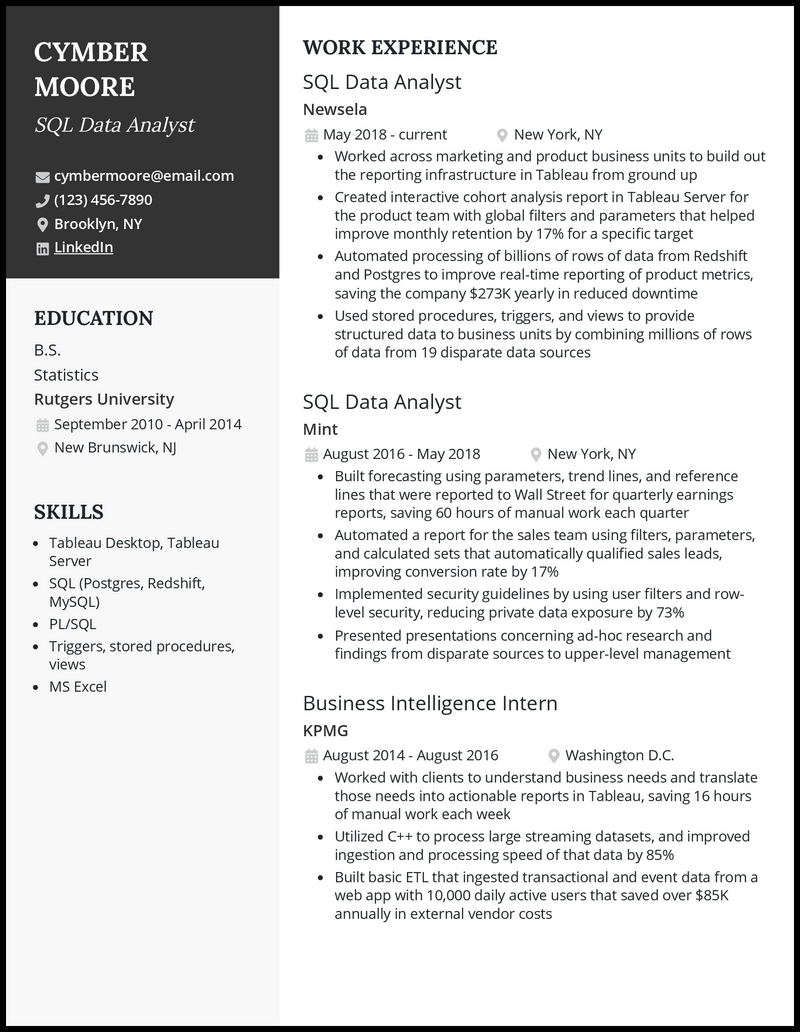You can write queries with the best of them and turn raw data into meaningful insights. When it comes to doing analysis or building reports, there is no one better. How then, can you make a cover letter and let your resume showcase your skills in the best way possible?
That’s where we come in. These SQL data analyst resume examples have helped job seekers land jobs at companies like Google and Microsoft, so there a great place to start when trying to land your next data analyst job.
Related resume examples
What Matters Most: Your Skills & Work Experience

Unlike when parents say, “I love all my children equally,” we won’t sit here and lie to you. When it comes to your SQL data analyst resume, two sections matter above all others.
Your skills section and your work experience will be the first things a recruiter jumps to when determining whether or not you’ll get an interview. Luckily (or unluckily depending on who you ask) we’ve analyzed thousands of SQL data analyst resumes and here’s what works to improve your interview chances.
9 Most Popular
SQL Data Analyst Skills
- SQL
- Data visualization
- Tableau/ Power BI
- Python
- A/B testing
- Excel/ Google Sheets
- Stored procedures
- PL/SQL
- Triggers
A question we’re often asked is, “should I include XYZ skill on my resume?” As a rule of thumb, only include skills you’d be comfortable being interviewed on.
Sample SQL Data Analyst Work Experience Bullet Points
The simplest way to make sure your work experience bullet points are effective is to include the impact (in numbers) that you had. You want to focus on your impact, not your responsibilities.
The formula is simple: [action you took] + [context/skills you used] + [outcome of action]
It’s okay if these outcomes are rough estimates or are not related to revenue. Just show you focus on what matters, quantifiable impact!
Here are a few samples:
- [Automated a report] for the sales team [using filters and parameters that automatically qualified sales leads], [improving conversion rate by 17%].
- [Automated processing of billions of rows of data] from [Redshift and Postgres to improve real-time reporting of product metrics], [saving the company $273K yearly in reduced downtime].
- [Used stored procedures, triggers, and views] to [provide structured data to business units] by [combining millions of rows of data from 19 disparate data sources].
- You can invert the formula, feel free to get wild with it!
- [Built basic ETL] that [ingested transactional and event data from a web app with 10,000 daily active users] that [saved over $85K annually in external vendor costs].
This section is meant to serve as a quick reference. After helping hundreds of SQL data analysts land jobs, we put together the top tips and frequently asked questions that led to the most success (i.e. job offers) for those we worked with.
Top 5 Tips for Your SQL Data Analyst Resume
- Focus on your impact in your past roles, not your responsibilities
- A good resume is not the place to re-type the job description for the SQL data analyst roles you’ve held in the past. Instead, employers want to know you had a meaningful impact in your past roles. So, whenever possible, try to quantify your impact in your past roles.
- Quantifying your impact isn’t all about the money
- Quantifying your impact can feel confusing at first, but remember, it’s not all about saving the company money. You could have saved hours by automating reports, reduced downtime by creating real-time alerts, or improved efficiency through queries you wrote.
- Don’t lie
- Look, we know this one seems obvious, but when you find a role you’re really excited about applying for, you may want to seem like the perfect SQL data analyst candidate and be tempted to embellish a few things. It’s not worth it. Lying is a surefire way to be blacklisted from a company in the future.
- When to include a career summary
- 95% of the time recruiters will skip over your summary. Why? Because most of them are too generic to differentiate from each other. So, unless you are going to take the time to customize it for each job you apply to, you’re better off skipping the summary and using that additional real-estate on your SQL data analyst resume to talk about your work experience.
- Unless you have 10+ years of experience, keep it to one page
- You’ve probably heard that recruiters are inundated with resumes when they open SQL data analyst roles (getting over 100 resumes within the first week is not unheard of). So, you will have more success if you make the recruiter’s job easier. How can you do this? By formatting your resume well and making it skimm-able by keeping it to one page.
Frequently Asked Questions
- How should I format my SQL data analyst resume?
- The first rule for formatting your resume is to make it readable. This means you should have ample spacing and don’t try to cram as much text in as you can. Unless you have 10+ years of experience keep your resume to one page. Finally, your work experience should be in descending order (that is, your most recent work experience goes at the top).
- What sections should I include on my SQL data analyst resume?
- The standard sections for your SQL data analyst resume are your contact information, your education, your skills, and your work experience. Optional sections include your certifications, projects, and hobbies. You should include those optional sections if you have something to add that you think will improve your chances of landing an interview.
- Should I include my certifications or personal projects on my resume?
- Absolutely! Your SQL data analyst resume is not the time to be humble. Data analysis is data analysis whether you did it for a company or you did it for a personal project. One of the biggest reasons our co-founder landed his first data analyst job was his project analyzing data to try to help his fantasy football team!










